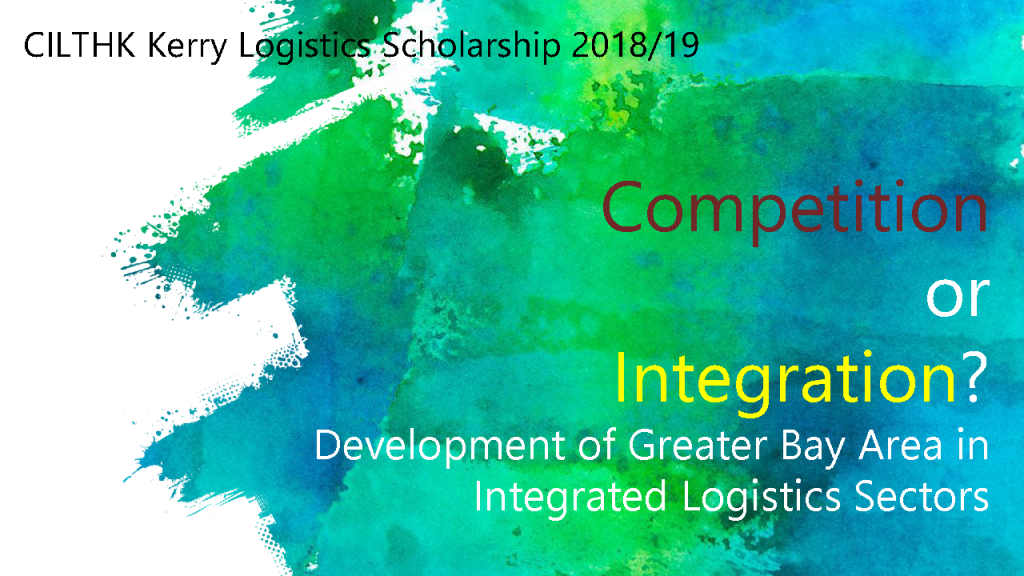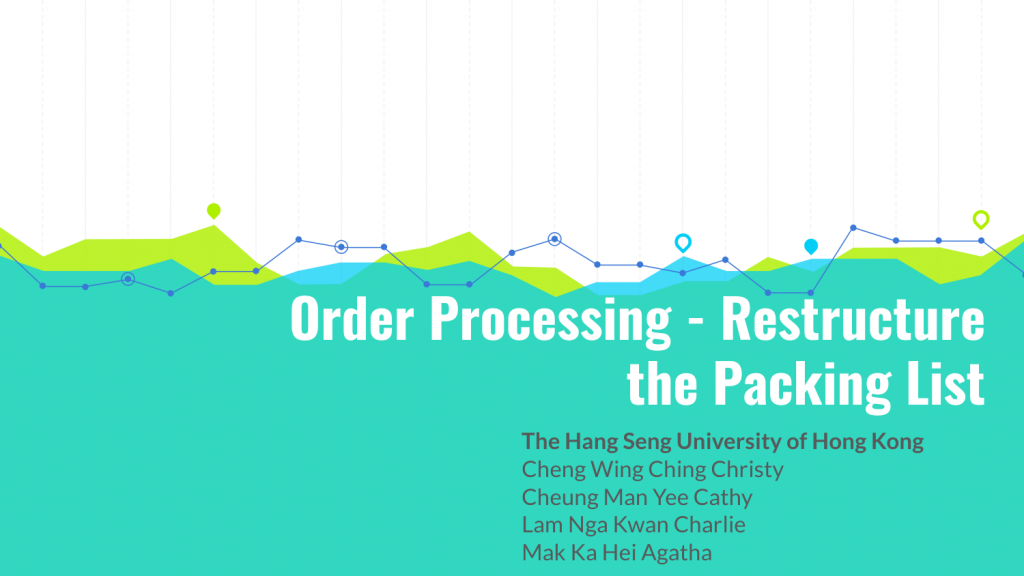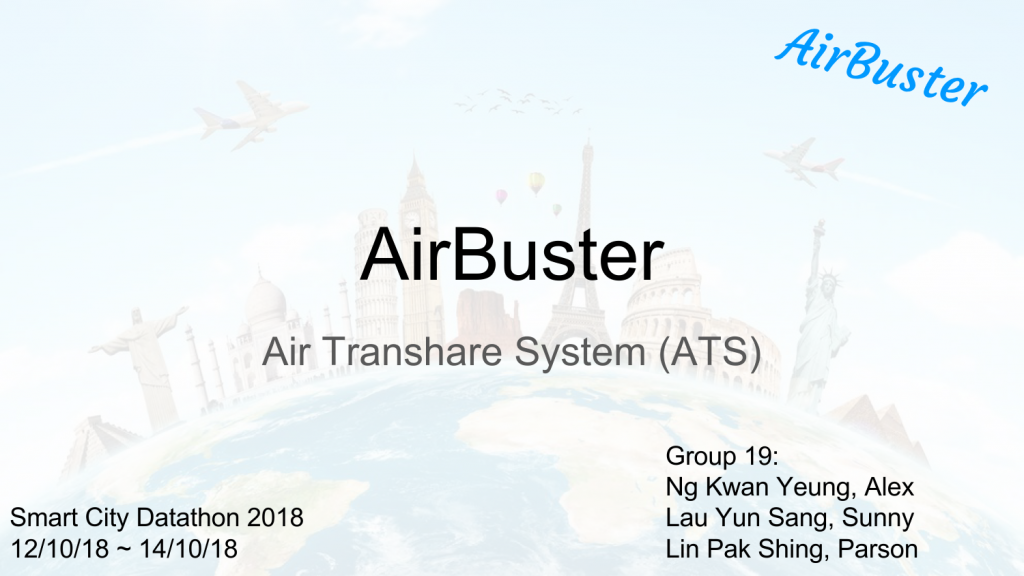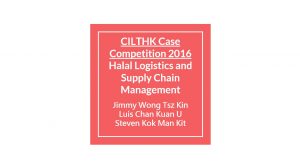-
CILTHK Kerry Logistics Scholarship 2018/19
Lam Nga-kwan, Charlie (BBA-SCM, Year 4) has won the CILTHK Kerry Logistics Scholarship 2018/19. Among the participants from tertiary institutions, Charlie Lam was awarded the Scholarship in the Bachelor’s Degree category.
The scholarship has several rounds of selection, based upon a series of documentary assessment and a final presentation after a visit to Kerry Logistics. Charlie made a presentation on “How does the development of the Greater Bay Area affect the Integrated Logistics sector in Hong Kong?”
-
Hong Kong Logistics Case Competition 2019
The Hong Kong Logistics Case Competition 2019 was held between 22 and 24 February 2019 aiming at promoting practical problem-solving skill and creative thinking capability of our post-secondary logistics students. It is a team-based intensive case competition in a simulated business reality where students need to resolve work place problem and enhance their career development. A total of eight teams from universities and community colleges in Hong Kong, including Hong Kong University of Science and Technology and the Hong Kong Polytechnic University took part in this hackathon competition. Our BBA-SCM students won the champion in this competition.
-
Hang Seng Insurance x CUHK Business School Joint School Case Competition
BSC-AIN students joined the Hang Seng Insurance x CUHK Business School Joint School Case Competition to develop an innovative insurance product targeting the young segment. They beat teams from other universities and became the finalist.
-
Smart City Datathon 2018 (Top Six)
-
Sun Life Marketing Competition (Top Six)
-
CILTHK Case Competition 2016
CILTHK Case Competition 2016
1. Halal Logistics and Supply Chain Management
News Released: Oriental Daily:「引入清真物流學生方案新創見」
-
HSMC Innovation Project Competition
About the Competition
“The HSMC Innovation Project Competition” aims to promote a culture of innovation & creativity and enrich student learning experience at HSMC. The submission should demonstrate the creative concepts, innovative design/modeling, as well as the applicability and impact.
The competition is organised in three areas: Business, Social and Humanities Innovations.
(1) Social Innovation
– Integrative technologies: enabling universal accessible transportation services (2017 Merit Award)
Members: Chung Wing Hang, Li Shing Fung, Mak Sze Hon
Abstract
In this project, we study an integrative transportation system to provide universal accessible transportation services for people with disabilities and the elderly. In Hong Kong, the number of people with disabilities has increased by approximately 60%, from 361,300 in 2007 to 578,600 in 2013. According to a report from Census and Statistics Department in 2015, our society will become an ageing population. The median age would rise from 42.8 in 2014 to 51.0 in 2064. Hong Kong is obviously facing the challenges of serving elderly people in near future. To deal with the increasing demands of universal accessible transportation services, the government not only need to provide additional specialized vehicles but also support the development of an integrative transportation system for managing the increase of complexity in operations. This project aims to propose integrative technologies for enabling universal accessible transportation service for sustainability in Hong Kong. The integrative technologies include: 1) Data Visualization; 2) Vehicle Scheduling System; 3) Mobile apps.
(2) Business Innovation
– Smart Technologies for Maintaining Your Product Lifetime Value (2016 Excellence Award)
Members: Anson Lee, Johnny Yao, Alex Yung
Abstract
This project aims to explore the smart technologies for the service parts industry with the case study of Company R. Online and offline solutions are innovated to optimize the operations:
A) Online solution: A multi-functional mobile app for stock taking and real-time inventory monitoring system through cloud database.
B) Offline solution: A visualization interface of stockroom layout with the optimal routing plan for responding customer orders.

– Leveraging the Big Data Analytics for SMEs (2016 Merit Award)
Members: Vanessa Chan, Eva Leung, Kinson Lok
Abstract
The objective of this project is to innovate a business intelligent tool for small-medium sized enterprises (SMEs) to enhance their decisions quality and identify the rooms for continuous improvement. . In particular, this tool is designed for the procurement function which aims to achieve just-in-time strategy. The project was worked with Tung Fat Ho Building Material Ltd (TFH), which is one of the leading ironmongery suppliers in Hong Kong, to collect the large amount of data from their enterprise resource planning (ERP) system. The business intelligent tool consists of two parts. The first part is composed of the database software, Microsoft Access, to transform the unstructured data among various unstructured reports to become structured data in the relational dataset. The second part of business intelligent tool is developed in the spreadsheet software, Microsoft Excel, serving as an analytical platform to shows different levels of key performance indicators a dashboard. The project aims to develop business intelligent tools which are comparable to the large enterprises operations but also are affordable in small-medium sized enterprises.

-
SCM 4201 Current Issues in Supply Chain Management and Logistics
SCM4201 Current Issues in Supply Chain Management & Logistics
Supervisor: Prof. LEUNG Chi Kin, Lawrence
1. How S.F. Express make use of technology and service to support e-commerce market
2. How S.F. Best cold chain survive in the fresh food e-commerce market?
3. How omni-channel approach affect Supply Chain of Alibaba in China?
4. How SF Express uses Social Media
-
SCM4304 Honours Project I & II
SCM4304 Honours Project I & II
1. Analysis on arrival sequencing methods for smoothing arrival congestion and reducing arrival delay in HKIA
Supervisor: Dr. Karolina GLOWACKA
Abstract:
In this paper, arrival sequencing of Hong Kong International Airport (HKIA) is considered. By a better arrival sequence, wake turbulence can be reduced and overall delay can be minimized. Hence, arrival congestion can be soothed. Simio 8 is used to simulate the current situation with 3D animation. Two original models using FIFO and EDD as well as two modified models with consideration of multiple factors using FIFO and EDD were tested in Simio. Result shows that the modified FIFO models could lead to 9.5% improvement in arrival delay.
News Released: Sing Tao Daily:「恒管生研起飛排序 減一成延誤」
2. Optimizing the Service Parts Operations with Emergent Technologies
Supervisor: Dr. Daniel MO
Abstract:
In recent year, the service parts management receives new attentions due to the higher profitability of its business models as well as the product sustainability. However, the high demand uncertainty of the service parts and the requirement of providing high responsive service become the major challenges of this industry. As those challenges limit the industrial development, this study focuses on reviewing the characteristics and challenges of the service parts industry. Through conducting qualitative analysis and developing the analytical prototype, the project would give an innovative insight for the companies in the service parts industry to increase their competitiveness.
This project includes online and offline solutions with emergent and innovative smart technology to enhance the operation performance of the largest photocopier company in Hong Kong. The offline tool is a data visualization interface of warehouse layout with the identification of optimal routing plan for responding customer orders. The online tool is a multi-functional mobile app for stock taking and real-time inventory monitoring system connected to a cloud database. By applying the online and offline tools, the efficiency of operation can be improved and optimized with 47% of improvement in the operations efficiency of stock taking. For the warehouse management, the allocation of service parts is visualized and learning to be optimal, which would reduce 10% to 28% of total walking distance. With the online solution, the inventory status can be visualized anywhere.
Navigation Menu
